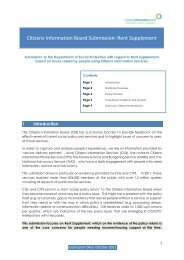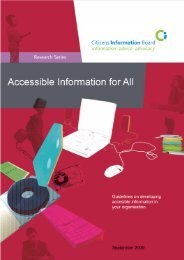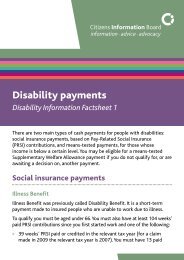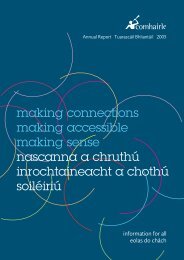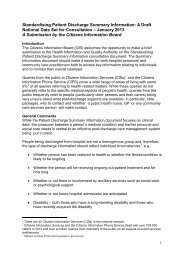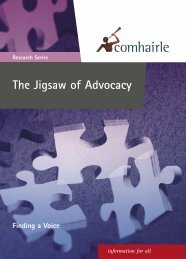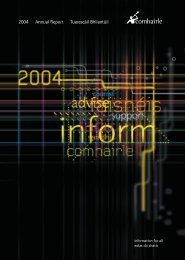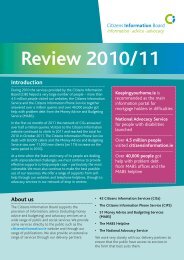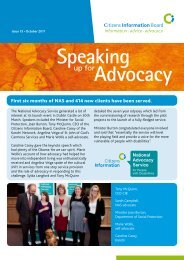Review of Sign Language Interpretation Services and Service ...
Review of Sign Language Interpretation Services and Service ...
Review of Sign Language Interpretation Services and Service ...
- No tags were found...
Create successful ePaper yourself
Turn your PDF publications into a flip-book with our unique Google optimized e-Paper software.
7.6.2 Interpreter skills <strong>and</strong> trainingInterpreters need to be fully competent <strong>and</strong> interpretation needs to be <strong>of</strong> a highst<strong>and</strong>ard. The education <strong>of</strong> interpreters falls under the remit <strong>of</strong> the Department <strong>of</strong>Education <strong>and</strong> Science. However, it is recommended that the formal education <strong>of</strong>interpreters at the Centre for Deaf Studies in Trinity College Dublin be sustained<strong>and</strong> improved going forward. A range <strong>of</strong> suggestions were made by differentstakeholders during this review:• Setting <strong>of</strong> higher entry st<strong>and</strong>ards in Irish <strong>Sign</strong> <strong>Language</strong> for entry to SLI courses• Extending the SLI Diploma course in the Centre for Deaf Studies• Potentially <strong>of</strong>fering a second course in SLI at another third level institution inIrel<strong>and</strong> to facilitate a more even geographic spread <strong>of</strong> interpreters• The development <strong>of</strong> short training/induction courses for interpreters wheninterpreting in special environments e.g. courts, hospitals• Offering a continuing pr<strong>of</strong>essional development path for interpreters• Offering training in remote interpretation <strong>and</strong> utilising technology forinterpretersIt is recommended that the above suggestions should be considered as part <strong>of</strong> anyeducation development strategy for SLI services.7.6.3 AccreditationAn accreditation process is an essential component <strong>of</strong> a quality SLI service. Somework on accreditation is currently underway, under the aegis <strong>of</strong> Irish <strong>Sign</strong> Link.Given its importance, it is recommended that an effective accreditation process forinterpreters be established as a matter <strong>of</strong> urgency.Some <strong>of</strong> the key elements <strong>of</strong> a leading practice accreditation process include:• Mapping <strong>of</strong> qualifications against national st<strong>and</strong>ards• Monitoring <strong>of</strong> exit st<strong>and</strong>ards from interpreter training• Different categories <strong>of</strong> registration• Mapping <strong>of</strong> recognised training programmes• Separation <strong>of</strong> the awarder <strong>of</strong> the qualification from the accreditation body• Codes <strong>of</strong> ethics/practice• Complaints <strong>and</strong> disciplinary procedure (<strong>and</strong> appeals)• Registration requirements e.g. police checks <strong>and</strong> insurance• Registration restrictions e.g. limits to how many years people can stay in aprogression category• Registration maintenance e.g. evidence <strong>of</strong> continuous pr<strong>of</strong>essionaldevelopmentThe accreditation process should be designed <strong>and</strong> managed by an independentbody.<strong>Review</strong> <strong>of</strong> <strong>Sign</strong> <strong>Language</strong> <strong>Interpretation</strong> <strong><strong>Service</strong>s</strong> <strong>and</strong> <strong>Service</strong> Requirements in Irel<strong>and</strong> • page 133



